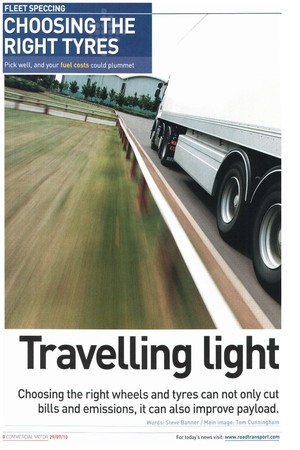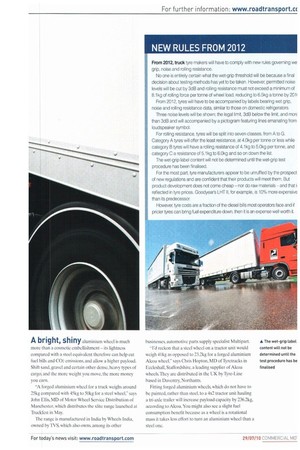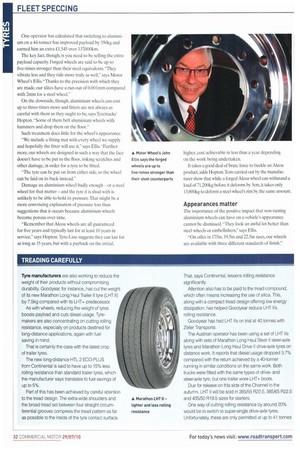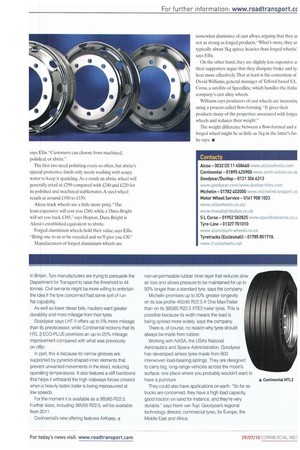Travelling Light
Page 30

Page 31

Page 32

Page 33

If you've noticed an error in this article please click here to report it so we can fix it.
Choosing the right wheels and tyres can not only cut bills and emissions, it can also improve payload.
Words: Steve Banner / Main image: Tom Cunningham
A bright, shiny aluminium wheel is much more than a cosmetic embellishment — its lightness compared with a steel equivalent therefore can help cut fuel hills and CO2 emissions, and allow a higher payload. Shift sand, gravel and certain other dense, heavy types of cargo, and the more weight you move, the more money you earn.
"A forged aluminium wheel for a truck weighs around 25kg compared with 45kg to 50kg for a steel wheel," says John Ellis, MD of Motor Wheel Service Distribution ol Manchester, which distributes the xlite range launched at Truckfest in May The range is manufactured in India by Wheels India. owned by TVS. which also owns, among its other businesses, automotive parts supply specialist Multipart.
"I'd reckon that a steel wheel on a tractor unit would weigh 41kg as opposed to 23.2kg for a forged aluminium Alcoa wheel," says Chris Hopton, MD of Tyre tracks in Eccleshall, Staffordshire, a leading supplier of Alcoa wheels.They are distributed in the UK hy Tyre-Line based in Daventry, Northants.
Fitting forged aluminium wheels, which do not have to be painted, rather than steel, to a 4x2 tractor unit hauling a tri-axle trailer will increase payload capacity by 236.2kg, according to Alcoa. You might also see a slight fuel consumption benefit because as a wheel is a rotational mass it takes less effort to turn an aluminium wheel than a steel one. One operator has calculated that switching to aluminium on a 44-tonner has improved payload by 350kg and earned him an extra £1,545 over 137,000km.
The key fact, though, is you need to be selling the extra payload capacity. Forged wheels are said lobe up to five-times stronger than their steel equivalents. "They vibrate less and they ride more truly as well,says Motor Wheel's Ellis. "Thanks to the precision with which they are made, our xlites have a run-out of 0.001mm compared with 2rnm for a steel wheel."
On the downside, though. aluminium wheels can cost up to three-times more and fitters are not always as careful with them as they ought to be, says Tyretracks' Hopton. -Some of them belt aluminium wheels with hammers and drop them on the floor.
Such treatment does little for the wheel's appearance.
"We include a fitting mat with every wheel we supply and hopefully the titter will use it.says Ellis. -Furthermore, our wheels are designed in such a way that the face doesn't have to be put to the floor, risking scratches and other damage, in order for a tyre to he fitted.
-The tyre can be put on from either side, so the wheel can be laid on its back instead.
Damage an aluminium wheel badly enough or a steel wheel for that matter and the tyre it is shod with is unlikely to be able to hold its pressure. That might be a more convincing explanation of pressure loss than suggestions that it occurs because aluminium wheels become porous over time.
"Remember that Alcoa wheels are all guaranteed for five years and typically last for at least 10 years in service," says Hopton.Tyre-Line suggests they can last for as long as 15 years, but with a payback on the initial, higher, cost achievable in less than a year depending on the work being undertaken.
It takes a good deal of brute force to buckle an Alcoa product, adds Hopton. Tests carried out by the manufacturer show that while a forged Alcoa wheel can withstand a load of 71200kg before it deforms by 5cm, it takes only 13,600kg to deform a steel wheel's rim by the same amount.
Appearances matter
The importance of the positive impact that non-rusting aluminium wheels can have on a vehicle's appearance cannot he dismissed. "They look an awful lot better than steel wheels or embellishers," says Ellis.
"On offer in 17.5in, 19.5in and 22.5in sizes, our wheels are available with three different standards of finish,"
says Ellis."Customers can choose from machined, polished, or xbrite."
'the first two need polishing every so often, but xbrite's special protective finish only needs washing with soapy water to keep it sparkling. As a result an xbritc wheel will generally retail at 1299 compared with £240 and £220 for its polished and machined stablemates. A steel wheel retails at around £100 to £150.
Alcoa truck wheels are a little more pricy. "The least-expensive will cost you £260. while a Dura-Bright will set you back £385." says Hopton. Dura-Bright is Alcoas established equivalent to xbrite.
Forged aluminium wheels hold their value, says Ellis "Bring one to us to be recycled and we'll give you £30." Manufacturers of forged aluminium wheels are somewhat dismissive of cast alloys, arguing that they ai not as strong as forged products. -What's more, they ar typically about 5kg apiece heavier than forged wheels,' says Ellis.
On the other hand, they are slightly less expensive a their supporters argue that they dissipate brake and ty] heat more effectively. That at least is the contention of David Williams. general manager of Telford-based S L Corse, a satellite of Speedline, which handles the Italia company's cast alloy wheels.
Williams says producers of cast wheels arc increasini using a process called flow-forming. "It gives their products many of the properties associated with forget wheels and reduces their weight."
The weight difference between a flow-formed and a forged wheel might be as little as lkg in the latter's lay he says.




























































































































